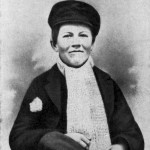 It was not easy for the young Thomas Edison to get an education. In the fall of 1854, Little Al (as he was then known) was enrolled in the school of Reverend G. B. Engle, a strict disciplinarian who taught by rote. The easily distracted Al didn’t do well under such conditions, and ran away. The reverend’s wife called Edison “addled” and “dreamy,” neither of which was intended as a compliment. Furious, Edison’s strong-willed mother pulled him from the school and home-schooled him with a rigorous regimen studying a variety of subjects, reading literature, and memorizing. Above all else, Edison was a voracious reader. With his mother’s guidance, he read Gibbon’s The History of the Decline and Fall of the Roman Empire, Hume’s History of England, Sears’ History of the World, Burton’s Anatomy of Melancholy, and the Dictionary of Sciences.
It was not easy for the young Thomas Edison to get an education. In the fall of 1854, Little Al (as he was then known) was enrolled in the school of Reverend G. B. Engle, a strict disciplinarian who taught by rote. The easily distracted Al didn’t do well under such conditions, and ran away. The reverend’s wife called Edison “addled” and “dreamy,” neither of which was intended as a compliment. Furious, Edison’s strong-willed mother pulled him from the school and home-schooled him with a rigorous regimen studying a variety of subjects, reading literature, and memorizing. Above all else, Edison was a voracious reader. With his mother’s guidance, he read Gibbon’s The History of the Decline and Fall of the Roman Empire, Hume’s History of England, Sears’ History of the World, Burton’s Anatomy of Melancholy, and the Dictionary of Sciences.
Later, during a brief attendance at the Union School in Port Huron, Richard Green Parker’s A School Compendium of Natural and Experimental Philosophy fed his growing interest in science. Another favorite book was Carl Fresenius’ System of Instruction in Chemical Analyses. He tried to read Newton’s Principia, but later admitted he was stymied by the math, which was beyond his capability. With that exception, his excellent memory allowed him to retain virtually everything he read.
If ever there was a man who tore the heart out of books it is Edison, and what has been read by him is never forgotten if useful or worthy of submission to the test of experiment.
Early on Edison displayed a trait that would bode well for his chosen avocation: He questioned everything. Ironically, this led his father to wonder if he was a bit dim-witted. Little Al had to know everything, and he nearly drove his father to exhaustion with his incessant inquiries. One early biographer described young Edison as having “the inquisitiveness of a red squirrel.” He hung around shipbuilders and asked them question after question about building ships, steam power, sailing, and whatever else he could think of. To say he was a curious child would be an understatement.
Young Edison developed a profound interest in chemistry, building up a collection of some 200 bottles of chemicals in the family basement, duly labeled “Poison” to keep away prying eyes. Visits to local drug store proprietors, and his incessant inquisitiveness, made him knowledgeable about most chemicals. He began doing experiments from chemistry and physics books he got from the local library, and had “tested to his satisfaction many of the statements encountered in his scientific reading.” His experiments made him familiar with the workings of early electrical batteries and the production of current, knowledge that would come in handy in his life as an electrical wizard.
[Adapted from my book, Edison: The Inventor of the Modern World]
David J. Kent is the author of Lincoln: The Man Who Saved America, now available. His previous books include Tesla: The Wizard of Electricity and Edison: The Inventor of the Modern World (both Fall River Press). He has also written two e-books: Nikola Tesla: Renewable Energy Ahead of Its Time and Abraham Lincoln and Nikola Tesla: Connected by Fate.
Check out my Goodreads author page. While you’re at it, “Like” my Facebook author page for more updates!
Follow me by subscribing by email on the home page. Share with your friends using the buttons below.










